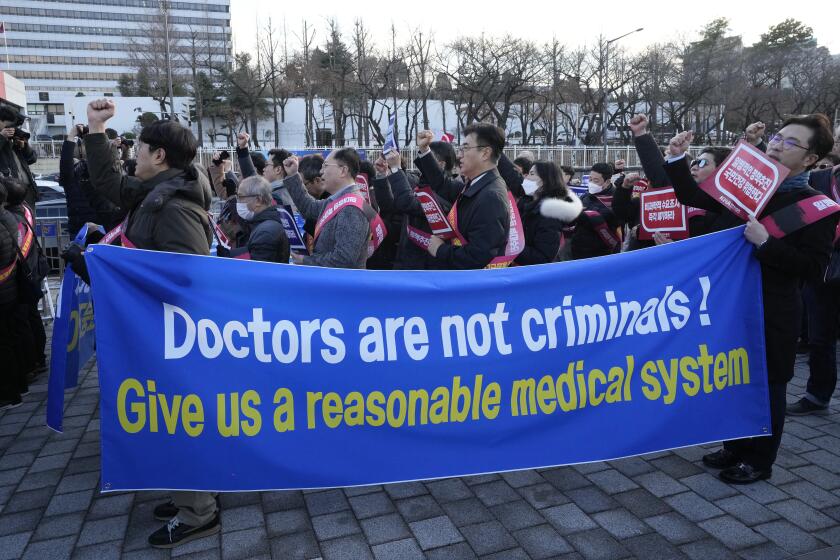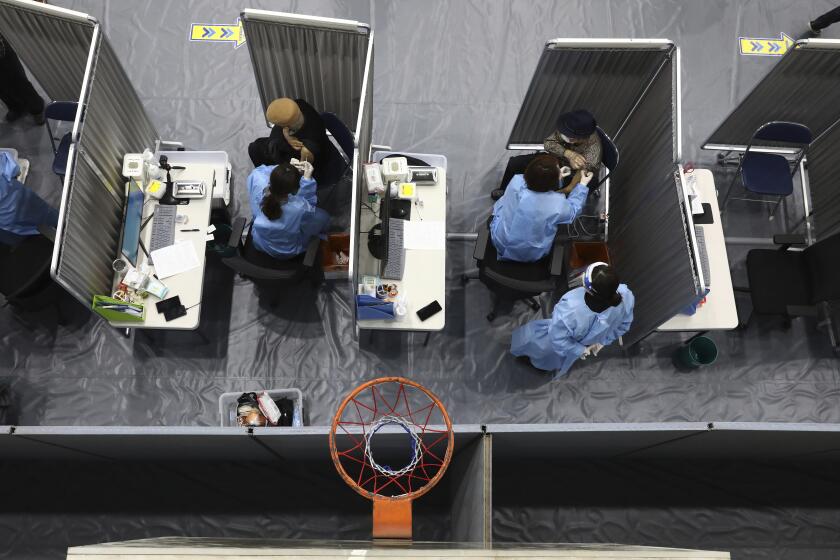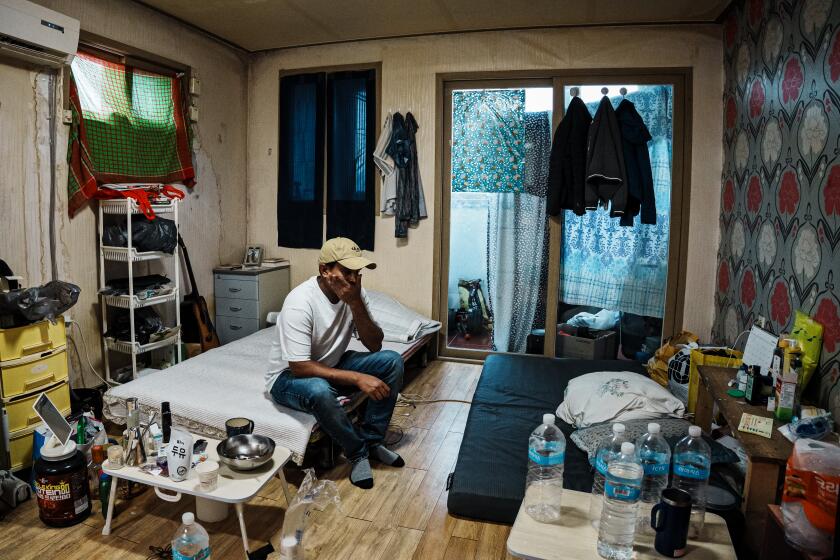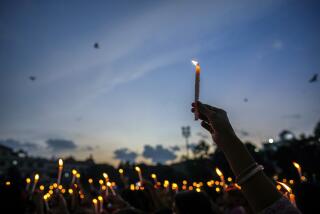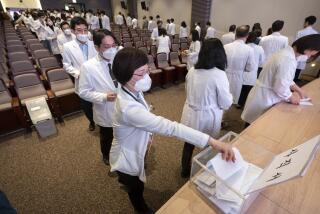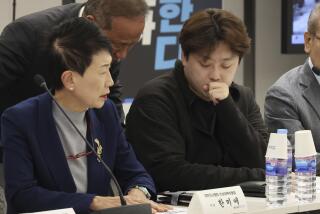Thousands of Korean doctors face license suspensions as Seoul moves to prosecute strike leaders
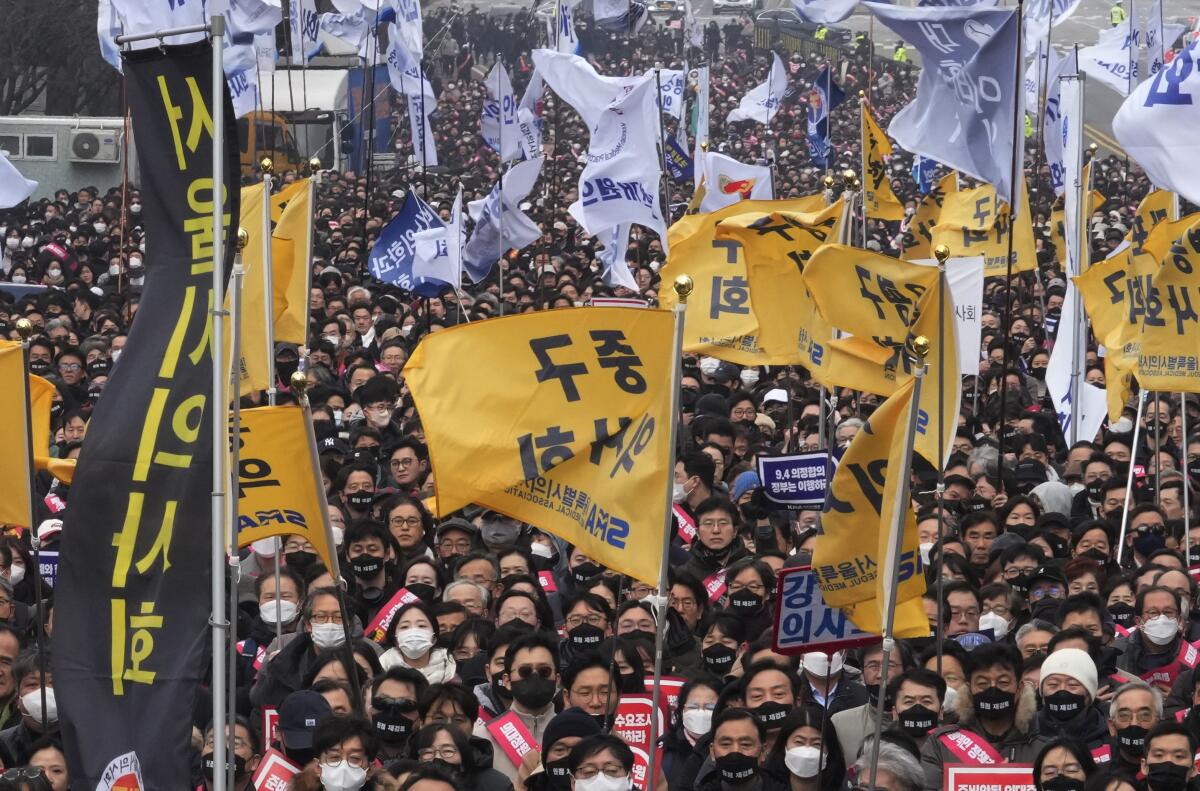
- Share via
SEOUL, South Korea — Thousands of striking junior doctors in South Korea faced proceedings to suspend their medical licenses Tuesday, while authorities pushed for police investigations into leaders of the walkouts that have disrupted hospital operations.
Nearly 9,000 of South Korea’s 13,000 medical interns and residents have been refusing to work for the past two weeks to protest a government plan to enroll thousands more students in the country’s medical schools in coming years. The government ordered them to return to work by Feb. 29, citing a threat to public health, but most have defied the threats of license suspensions and prosecutions.
Officials say South Korea must add more doctors to deal with a fast-aging population and plan to raise yearly medical school enrollment by 2,000 from the current 3,058, starting next year. But many doctors say universities aren’t ready to deal with that abrupt increase in the number of students and that the country’s overall medical service would eventually be hurt.
Junior doctors in South Korea are striking to protest the government recruiting more medical students to cope with the country’s fast-aging population.
On Monday, the Health Ministry sent officials to hospitals to confirm the absence of the striking doctors, in order to begin administrative steps to suspend their licenses. So far, the government has formally confirmed the absence of more than 7,000 strikers. On Tuesday, officials continued on-site inspections of hospitals and began sending notices to some strikers about license suspension proceedings, according to the Health Ministry.
Vice Health Minister Park Min-soo said licenses would be suspended for at least three months. Doctors are to be given opportunities to respond before suspensions take effect.
“The trainee doctors have left their patients defenseless. They’ve even left emergency rooms and intensive care units,” Park said. “We can’t tolerate these irresponsible acts. They have betrayed their professional and ethical responsibilities and neglected their legal duties.”
“For those who lead the walkouts, we are thinking we’ll file complaints with police,” Park told a briefing. “But I tell you that we haven’t determined exactly when we would do so and against whom.”
With part-time jobs decimated by the COVID-19 pandemic, young South Koreans turn to being lab rats for quick cash
Under South Korea’s medical law, doctors who defy orders to resume work can be punished with three years in prison or a 30 million-won (roughly $22,500) fine, as well as a up to one year’s suspension of their medical licenses. Those who receive prison sentences can lose their licenses.
Observers say the government will likely end up punishing only strike leaders, not all of the thousands of striking doctors. They say it would take a few months to complete the administrative steps to suspend the licenses of all the 9,000 striking doctors.
One of the striking junior doctors told the Associated Press on Tuesday that he and others have no intentions of returning to work.
“We had only worked to save patients but the government has made us criminals in a moment. Trainee doctors including me were hurt a lot,” said the doctor, who wished to be only identified by his family name, Jeong, because of fears that publicity would earn him stronger punishment.
As South Korea’s migrant labor program ramps up recruitment, it faces scrutiny for what critics say is a failure to guarantee safe working conditions.
Another striking doctor told reporters that some may eventually yield to government pressure and return to their hospitals but she won’t do so. Still, she said she’s worried about legal measures she may face.
“The government is holding a briefing every morning, where a high-ranking official whom I can’t even dare to contact comes out and speaks. I don’t have any plans about what to do after my doctor’s license is suspended,” she said, requesting anonymity, citing similar concerns that publicity could make action against her worse.
The striking junior doctors are a small fraction of the country’s 140,000 doctors, but they account for 30-40% of the total doctors at some major hospitals, where they assist senior doctors while training.
Many senior doctors support the junior doctors but haven’t joined their walkouts.
South Korean police said they are investigating five senior members of the Korea Medical Assn., after the Health Ministry filed complaints against them for allegedly inciting and abetting the junior doctors’ walkouts.
More to Read
Sign up for Essential California
The most important California stories and recommendations in your inbox every morning.
You may occasionally receive promotional content from the Los Angeles Times.
